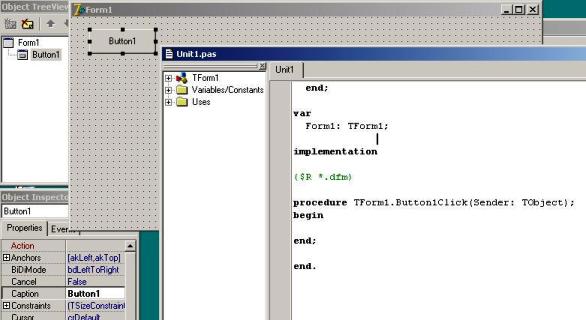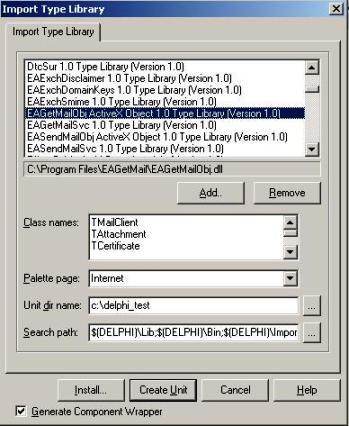Delphi - Mark email as read in POP3/IMAP/EWS/WebDAV¶
If you want to leave a copy of email on the server, you should not call Delete method.
However, there is a problem, how can you know if the email has already been downloaded
(read)? If there is a way to identify the downloaded email, you can avoid downloading
the duplicated email from your POP3/IMAP4 server.
Every email has a unique identifier (UIDL) on POP3 server. POP3 UIDL is only unique in the email life time. That means if the email was deleted from the server, other email can use the old unique identifier. Another problem is: UIDL in POP3 server can be any number or characters, so we cannot use UIDL as the file name, because UIDL may contain invalid characters for file name.
To solve this problem, we have to store the UIDL to a txt file and synchronize it with server every time.
The following delphi example codes demonstrate how to mark the email as downloaded/read on POP3 server.
Sections:
Installation¶
Before you can use the following sample codes, you should download the EAGetMail Installer and install it on your machine at first. Full sample projects are included in this installer.
Add reference¶
To better demonstrate how to retrieve email and parse email, let’s create a Delphi Standard EXE project at first, then add a TButton on the Form, double-click this button. It is like this:

To use EAGetMail ActiveX Object in your Delphi project, the first step is “Add Unit file of EAGetMail to your project”. Please go to
C:\Program Files\EAGetMail\Include\delphi or
C:\Program Files (x86)\EAGetMail\Include\delphi folder,
find EAGetMailObjLib_TLB.pas, and then copy this file to your project folder.
// include EAGetMailObjLib_TLB unit to your Delphi Project
unit Unit1;
interface
uses
Windows, Messages, SysUtils, Variants, Classes, Graphics, Controls, Forms,
Dialogs, EAGetMailObjLib_TLB, StdCtrls;
Then you can start to use it in your Delphi Project.
You can also create EAGetMailObjLib_TLB.pas manually by Delphi like this:
Delphi 7 or eariler version
First of all, create a standard delphi project: select menu
Project->Import Type Library, checkedEAGetMail ActiveX Objectand clickCreate Unit. Then includeEAGetMailObjLib_TLBin your project.
Delphi XE or later version
First of all, create a standard delphi project: select menu
Component->Import component...->Import a type library-> checkedEAGetMail ActiveX Object, haveGenerate Component Wrapperchecked and click “Create Unit”. Then includeEAGetMailObjLib_TLBin your project.
Delphi - Mark email as read in POP3 - example¶
The following example codes demonstrate marking email as read/downloaded on POP3 server.
In order to run it correctly, please change email server, user, password, folder, file name value to yours.
Note
To get full sample projects, please download and install EAGetMail on your machine.
unit Unit1;
interface
uses
Windows, Messages, SysUtils, Variants, Classes, Graphics, Controls, Forms,
Dialogs, StdCtrls, StrUtils, EAGetMailObjLib_TLB; // Add EAGetMail unit
type
TForm1 = class(TForm)
Button1: TButton;
procedure Button1Click(Sender: TObject);
private
{ Private declarations }
public
{ Public declarations }
end;
const
MailServerPop3 = 0;
MailServerImap4 = 1;
MailServerEWS = 2;
MailServerDAV = 3;
MailServerMsGraph = 4;
var
Form1: TForm1;
implementation
{$R *.dfm}
procedure TForm1.Button1Click(Sender: TObject);
var
oServer: TMailServer;
oClient: TMailClient;
oTools: TTools;
oMail: IMail;
oUIDLManager: TUIDLManager;
infos: IMailInfoCollection;
oInfo: IMailInfo;
localInbox, fileName, fullFileName: WideString;
isUidlLoaded: Boolean;
leaveCopy: Boolean;
i: integer;
begin
// set current thread code page to system default code page.
SetThreadLocale(GetSystemDefaultLCID());
// leave a copy of message on server
leaveCopy := true;
isUidlLoaded := false;
// uidl is the identifier of every email on POP3/IMAP4 server, to avoid retrieve
// the same email from server more than once, we record the email uidl retrieved every time
// if you delete the email from server every time and not to leave a copy of email on
// the server, then please remove all the function about uidl.
oUIDLManager := TUIDLManager.Create(Application);
try
oTools := TTools.Create(Application);
localInbox := GetCurrentDir() + '\inbox';
oTools.CreateFolder(localInbox);
oUIDLManager.Load(localInbox + '\uidl.txt');
isUidlLoaded := true;
oServer := TMailServer.Create(Application);
oServer.Server := 'pop3.emailarchitect.net';
oServer.User := 'test@emailarchitect.net';
oServer.Password := 'testpassword';
oServer.Protocol := MailServerPop3;
// Enable SSL/TLS Connection, most modern email server require SSL/TLS connection by default.
oServer.SSLConnection := true;
// Set 995 SSL POP3 port
oServer.Port := 995;
// If your POP3 server doesn't deploy SSL connection
// Please use
// oServer.SSLConnection := false;
// oServer.Port := 110;
oClient := TMailClient.Create(Application);
oClient.LicenseCode := 'TryIt';
oClient.Connect1(oServer.DefaultInterface);
ShowMessage( 'Connected!' );
infos := oClient.GetMailInfoList();
ShowMessage(Format('Total %d email(s)', [infos.Count]));
// Remove the local uidl that is not existed on the server,
oUIDLManager.SyncUIDLEX(oServer.DefaultInterface, infos);
oUIDLManager.Update();
for i := 0 to infos.Count - 1 do
begin
oInfo := infos.Item[i];
// This email has not been retrieved before, then get it
if oUIDLManager.FindUIDL(oServer.DefaultInterface, oInfo.UIDL) <> nil then
continue; // this email has been downloaded, do not receive it again
// Generate a random file name by current local datetime,
// You can use your method to generate the filename if you do not like it
fileName := oTools.GenFileName(i) + '.eml';
fullFileName := localInbox + '\' + fileName;
// Receive email from POP3 server
oMail := oClient.GetMail(oInfo);
ShowMessage('From: ' + oMail.From.Address + #13#10 +
'Subject: ' + oMail.Subject);
// Save email to local disk
oMail.SaveAs(fullFileName, true);
if leaveCopy Then
begin
// Add the email uidl to uidl file to avoid we retrieve it next time.
oUIDLManager.AddUIDL(oServer.DefaultInterface, oInfo.UIDL, fileName);
end
else
begin
oClient.Delete(oInfo);
// Remove UIDL from local uidl file.
oUIDLManager.RemoveUIDL(oServer.DefaultInterface, oInfo.UIDL);
end;
end;
// Quit and expunge emails marked as deleted from POP3 server
oClient.Quit;
except
on ep:Exception do
ShowMessage( 'Error: ' + ep.Message );
end;
// Update the uidl list to a text file and then we can load it next time.
if isUidlLoaded then
oUIDLManager.Update();
end;
end.
UIDL Manager¶
UIDLManager provides an easier way to maintain UIDL between your server and your local client. It stores UIDL collection to a local disk file and you can use this object to add, remove and search UIDL with this local file.
Delphi - Retrieve unread/new email in IMAP4/EWS/WebDAV - example¶
Because IMAP/EWS/WebDAV support read mail flag, with this feature, we can also retrieve unread/new email only from IMAP4/EWS/WebDAV like this
unit Unit1;
interface
uses
Windows, Messages, SysUtils, Variants, Classes, Graphics, Controls, Forms,
Dialogs, StdCtrls, EAGetMailObjLib_TLB;
type
TForm1 = class(TForm)
Button1: TButton;
procedure Button1Click(Sender: TObject);
private
{ Private declarations }
public
{ Public declarations }
end;
const
MailServerPop3 = 0;
MailServerImap4 = 1;
MailServerEWS = 2;
MailServerDAV = 3;
MailServerMsGraph = 4;
// GetMailInfosParam Flags
GetMailInfos_All = 1;
GetMailInfos_NewOnly = 2;
GetMailInfos_ReadOnly = 4;
GetMailInfos_SeqRange = 8;
GetMailInfos_UIDRange = 16;
GetMailInfos_PR_ENTRYID = 32;
GetMailInfos_DateRange = 64;
GetMailInfos_OrderByDateTime = 128;
var
Form1: TForm1;
implementation
{$R *.dfm}
procedure TForm1.Button1Click(Sender: TObject);
var
oServer: TMailServer;
oClient: TMailClient;
oTools: TTools;
oMail: IMail;
infos: IMailInfoCollection;
oInfo: IMailInfo;
localInbox, fileName: WideString;
i: Integer;
begin
try
// set current thread code page to system default code page.
SetThreadLocale(GetSystemDefaultLCID());
oTools := TTools.Create(Application);
// Create a folder named "inbox" under
// current directory to store the email files
localInbox := GetCurrentDir() + '\inbox';
oTools.CreateFolder(localInbox);
oServer := TMailServer.Create(Application);
oServer.Server := 'pop3.emailarchitect.net';
oServer.User := 'test@emailarchitect.net';
oServer.Password := 'testpassword';
oServer.Protocol := MailServerImap4;
// Enable SSL/TLS Connection, most modern email server require SSL/TLS connection by default.
oServer.SSLConnection := true;
// Set 993 SSL IMAP4 port
oServer.Port := 993;
// If your IMAP doesn't deploy SSL connection
// Please use
// oServer.SSLConnection := false;
// oServer.Port := 143;
oClient := TMailClient.Create(Application);
oClient.LicenseCode := 'TryIt';
oClient.Connect1(oServer.DefaultInterface);
ShowMessage('Connected!');
// retrieve unread/new email only
oClient.GetMailInfosParam.Reset();
oClient.GetMailInfosParam.GetMailInfosOptions := GetMailInfos_NewOnly;
infos := oClient.GetMailInfoList();
ShowMessage(Format('Total %d unread email(s)', [infos.Count]));
for i := 0 to infos.Count - 1 do
begin
oInfo := infos.Item[i];
ShowMessage(Format('Index: %d; Size: %d; UIDL: ' + oInfo.UIDL,
[oInfo.Index, oInfo.Size]));
// Generate a random file name by current local datetime,
// You can use your method to generate the filename if you do not like it
fileName := localInbox + '\' + oTools.GenFileName(i) + '.eml';
// Receive email from POP3 server
oMail := oClient.GetMail(oInfo);
ShowMessage('From: ' + oMail.From.Address + #13#10 +
'Subject: ' + oMail.Subject);
// Save email to local disk
oMail.SaveAs(fileName, true);
// mark unread email as read, next time this email won't be retrieved again
if not oInfo.Read then
oClient.MarkAsRead(oInfo, true);
// if you don't want to leave a copy on server, please use
// oClient.Delete(oInfo);
// instead of MarkAsRead
end;
// Quit and expunge emails marked as deleted from POP3 server
oClient.Quit;
except
on ep:Exception do
ShowMessage('Error: ' + ep.Message);
end;
end;
end.
32bit/x64 ActiveX DLL¶
Seperate builds of run-time dll for 32 and x64 platform
| File | Platform |
| Installation Path\Lib\native\x86\EAGetMailObj.dll | 32 bit |
| Installation Path\Lib\native\x64\EAGetMailObj.dll | 64 bit |
Distribution¶
Standard EXE
For VB6, C++, Delphi or other standard exe application, you can distribute EAGetMailObj.dll with your application to target machine without COM-registration and installer. To learn more detail, please have a look at Registration-free COM with Manifest File.
Script
For ASP, VBScript, VBA, MS SQL Stored Procedure, you need to install EAGetMail on target machine by EAGetMail installer, both 32bit/x64 DLL are installed and registered.
Appendix
- Retrieve email and parse email in Delphi - Tutorial
- EAGetMail POP3/IMAP4 Component SDK
- Using UIDLManager to mark email as read/downloaded
- Download only unread/new emails from IMAP or MS Exchange Server
- Search emails and filter emails on IMAP or MS Exchange Server
- Retrieve emails from specified folder in IMAP or MS Exchange Server
Comments
If you have any comments or questions about above example codes, please click here to add your comments.
